Do you have a question about the Lennox Core Unit Controller and is the answer not in the manual?
Specifies minimum system requirements for the Lennox CORE Service App on Android and iOS devices.
Details features like 7-segment display, SmartWire system, BACnet IP, Ethernet switch, and USB port functionality.
Lists various configurable cooling and heating sequences, including VAV, economizer, and dehumidification.
Outlines built-in protections like compressor time-off delay, safety switch inputs, and smoke alarm modes.
Describes supported control methods like DDC, thermostats, BACnet, LonTalk, and various sensor inputs.
Explains the TSTAT_COM jumper for isolating thermostat sensor commons.
Explains the HMD_COM jumper for isolating humidistat sensor commons.
Describes the USB interface on the W4 control for service, reports, and firmware updates.
Details the S-Bus (SmartWire) connection, an R485 network interface.
Explains the Modbus connection via TIA-485 serial for multi-component communication.
Refers to LED indicators for status codes, with a note to see a specific page for details.
Details the status, indication, and meaning of various LEDs on the CORE Unit Controller.
Illustrates the push buttons (Test, Reset) and the Heartbeat LED on the local interface.
Lists status codes displayed on the seven-segment LED and their definitions.
Diagram showing connections, buttons (Pair, Reset, Cloud/IP), and LEDs on the W4 controller.
Explains how firmware updates are handled via the cloud, including requirements and process.
Lists supported network types: LON, BACNET, LCONN, RTU.
Provides an overview of unit operation, configuration, and data reading.
Visual representation of the CORE Service App menu navigation for Setup, Data, Service, and Settings.
Step-by-step guide on how to pair the CORE Service App with the CORE Unit Controller.
Focuses on zone temperature, RH, and current operating modes in room sensor mode.
Focuses on zone temperature, RH, and current operating modes in room sensor mode.
Lists parameters displayed in the system overview, including temperatures, setpoints, and status.
Lists various settings that can be configured within room sensor mode.
Covers the setup process, including date/time, RTU name, model number, and configuration IDs.
Explains how to configure the model number based on unit specifications.
Details the settings for Configuration ID 1, covering outdoor air control, smart airflow, and network modules.
Flowchart illustrating the navigation through the Install menu for unit setup and configuration.
Flowchart detailing the setup and configuration options for BACnet MS/TP network integration.
Flowchart outlining the setup and configuration for BACnet IP network integration.
Flowchart detailing the configuration and setup options for LonTalk network integration.
Flowchart illustrating the setup and configuration options for S-Bus network integration.
Flowchart for configuring the unit in Stand-Alone RTU mode.
Flowchart for setting up and provisioning wireless sensors within the network.
Flowchart for configuring cloud and IP connectivity for the unit.
Flowchart for testing and balancing motorized outdoor air dampers.
Flowchart for testing economizer operation using temperature settings.
Flowchart for testing economizer operation in global mode.
Flowchart for testing economizer operation in single or dual enthalpy modes.
Describes how active and past alarm codes are displayed and managed by the application.
Explains the internal storage and user-friendly format for trended data for troubleshooting.
Flowchart showing the display of software version, RTU description, and configuration IDs.
Flowchart detailing system inputs (local, network) and outputs (compressor, fans, etc.).
Describes how to perform tests on cooling/heating stages, blower, damper, and outdoor fans.
Flowchart illustrating the navigation for performing component tests.
Flowchart showing options for generating and saving service reports, system logs, and profiles.
Flowchart for advanced control functions like remote reset, clear delays, and controller lockout.
Details how to search for, download, and install firmware updates from the cloud or USB.
Explains the option for automatic cloud updates and the status of firmware installation.
Covers settings for blower, damper, dehumidifier, power exhaust, and general parameters.
Flowchart detailing RTU option settings for blower, damper, and dehumidifier configurations.
Flowchart for configuring power exhaust and editing various system parameters.
Flowchart illustrating the steps for unit installation and configuration.
Explains the function and operation of thermal protection switches and associated alarms.
Describes how network occupancy signals affect blower operation and ventilation.
Details the descriptions for different OCC Blower Modes like AUTO CYCLES and ON-CONTINUOUS.
Lists BACnet occupancy objects and their corresponding values for various inputs.
Step-by-step procedure to calibrate the economizer damper feedback for closed and open positions.
Describes operating profile options for the economizer damper during free cooling.
Explains how the controller displays outdoor air suitability for free cooling.
Details the enthalpy set point setting for single enthalpy free cooling mode.
Chart showing the approximate enthalpy sensor output at various temperatures and humidity levels.
Procedure to check the economizer output voltage for damper operation.
Procedure to check output voltage for damper position control.
Details the operation of the economizer in single enthalpy mode.
Details the operation of the economizer in dual enthalpy mode.
Describes economizer damper operation across various temperature modes.
Diagram showing how to measure current from enthalpy sensors A7 and A62.
Table providing resistor values for simulating temperatures in TMP mode.
Chart illustrating the default damper position based on CO2 levels for DCV.
Diagrams illustrating correct termination for daisy-chained BACnet networks.
A comprehensive list of abbreviations used throughout the document with their definitions.
Lists available parts and kits for the CORE Unit Controller, including catalog numbers.
Explains how the controller detects and alarms for incorrect phase, voltage, or frequency.
Describes alarms that result in the closure of service relay contacts (DO1).
Comprehensive table listing alarm codes, display messages, and event actions.
Comprehensive table listing alarm codes, display messages, and event actions.
Detailed table listing control parameters, their descriptions, min/default/max values, and units.
Details the inputs and outputs for the CORE Unit Controller (A55), referencing specific connectors.
Pinout and signal descriptions for the J304 S-Bus connector.
Pinout and signal descriptions for the J299 Digital Input connector.
Pinout and signal descriptions for the J297 TSTAT inputs and service relays connector.
Pinout and signal descriptions for the J298 Analog Sensors connector.
Pinout and signal descriptions for the J378 Duct Sensors connector.
Pinout and signal descriptions for J379, related to ultra condensers.
Pinout and signal descriptions for J380, related to smart air.
Pinout and signal descriptions for J381, related to indoor blower and outdoor fan speed.
Pinout and signal descriptions for J382, related to evaporators.
Pinout and signal descriptions for J383, related to ultra evaporators.
Pinout and signal descriptions for J384, related to the economizer.
Pinout and signal descriptions for J385, related to condensers.
Pinout and signal descriptions for J386, related to refrigerant loss detection.
Pinout and signal descriptions for J387, related to various options.
Pinout and signal descriptions for J388, related to pressure switches.
Pinout and signal descriptions for J389, related to compressors 1 and 2.
Pinout and signal descriptions for J390, related to relays.
Pinout and signal descriptions for J391, related to compressor 2-stage.
Pinout and signal descriptions for J392, related to the blower.
Pinout and signal descriptions for J393, related to gas heat.
Pinout and signal descriptions for J393, related to electric heat.
Pinout and signal descriptions for J394, related to reheat.
Pinout and signal descriptions for J388, related to the C Box.
Pinout and signal descriptions for J395, related to power input.
Pinout and signal descriptions for J358, related to Modbus and compressors.
Pinout and signal descriptions for J413, related to Modbus communication.
Pinout and signal descriptions for P397, related to compressor fans.
Pinout and signal descriptions for P398, related to compressors 3 and 4.
Pinout and signal descriptions for P399, related to pressure switches.
Pinout and signal descriptions for P400, related to 24VAC power.
Pinout and signal descriptions for P401, related to evaporators.
Pinout and signal descriptions for P402, related to ultra evaporators.
Pinout and signal descriptions for P403, related to various options.
Pinout and signal descriptions for P404, related to condensers.
Pinout and signal descriptions for J406, related to the DSI Board (A3) and M4 Control.
Pinout and descriptions for J374, detailing different motor versions.
Pinout and signal descriptions for J10, related to GV1 and S18.
Pinout and signal descriptions for J408, related to GV1 and S47.
Pinout and signal descriptions for J412, related to Modbus 2.
Pinout and signal descriptions for J411, related to Modbus 1.
Pinout and signal descriptions for J407, related to S10 and S21.
Diagram showing the components of the W4 Control unit, such as Wi-Fi, Ethernet, USB, and BACnet.
Important cautions to observe before and during the quick start procedures.
Illustrates the wiring connections for various components and control boards.
| Product Type | HVAC Controller |
|---|---|
| Compatibility | Lennox HVAC Systems |
| Input Voltage | 24 VAC |
| Operating Temperature | -40°F to 158°F (-40°C to 70°C) |
| Communication Protocol | BACnet, Modbus |
| Humidity Range | 5% to 95% RH, non-condensing |
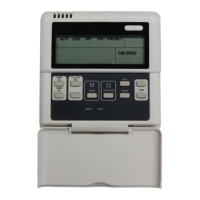
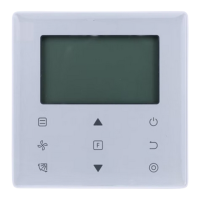
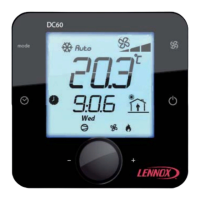
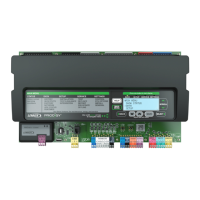
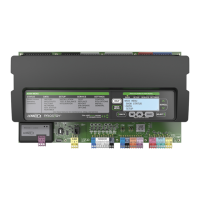
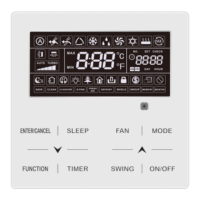

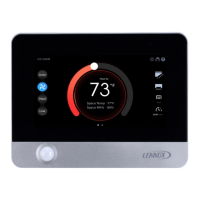
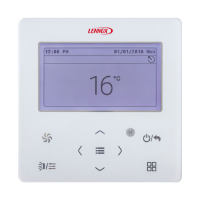
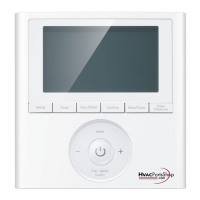
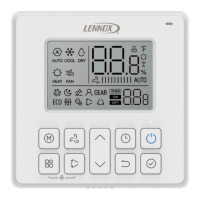
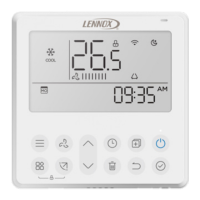
